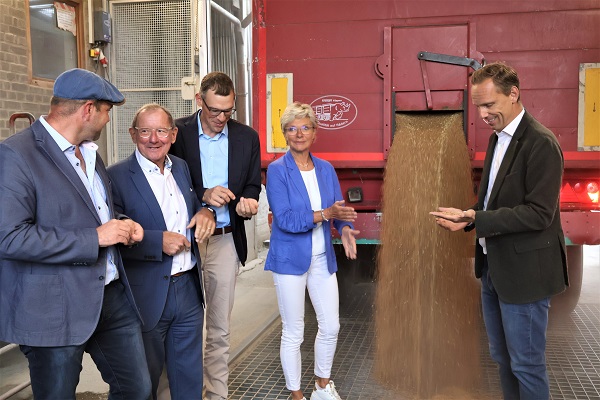 (L-R) Christian Hahn, Chamber of Agriculture; Fernand Etgen, Chamber of Deputies; Louis Boonen, Chamber of Agriculture; Martine Hansen, Minister of Agriculture, Food & Viticulture; Jean Muller, Director of Moulins de Kleinbettingen;
Credit: MA
(L-R) Christian Hahn, Chamber of Agriculture; Fernand Etgen, Chamber of Deputies; Louis Boonen, Chamber of Agriculture; Martine Hansen, Minister of Agriculture, Food & Viticulture; Jean Muller, Director of Moulins de Kleinbettingen;
Credit: MA
On Friday 6 September 2024, Luxembourg's Minister of Agriculture, Food and Viticulture, Martine Hansen, held harvest talks with representatives of the grain sector on the premises of the Moulins de Kleinbettingen.
The minister, together with the Moulins de Kleinbettingen, De Verband Group/ Versis, the Lëtzebuerger Saatbaugenossenschaft (LSG) and the Bauere Koperativ (BAKO), took stock of the yields.
The Ministry of Agriculture, Food and Viticulture and the represented organisations reported about 20% yield losses for winter cereals but good to above-average yields for summer cereals, rapeseed and potatoes.
Due to the heavy rainfall in winter and spring, muddy soils, poor sowing conditions in some places, waterlogging and fungal infestation, winter cereals (wheat, barley) recorded yield losses of 15-20% compared to the five-year average. Losses were noted particularly on the heavy soils of the Guttland (central/western) region and along the Moselle (south-east), although yields were better on the lighter soils of the Oesling (northern) region.
The "Produit du terroir" label bread wheat recorded a low yield of 8,600 tonnes in total, which is 30% less than a normal year. In addition, the grains had a very low hectolitre weight and an average protein content, according to Jean Muller, Director of Moulins de Kleinbettingen.
The LSG seed growers' cooperative also confirmed a wide range in the harvested seed depending on the location, from above-average sized and good grains on light soils to small ones on heavy soils, according to Director Steve Turmes. As for summer cereals (oats, summer wheat), the harvest has gone well in the good weather period since the end of July and the yields are generally good. The rapeseed harvest was correct this year, although with large yield differences. Potato cultivation also recorded good yields. Plant protection measures against fungal diseases were important in all crops this year to secure yields.
The ministry and sector representatives noted that global producer prices for grain are currently recovering slightly after the harvest pressure, but the long-term price level (before Russia's full-scale invasion of Ukraine in 2022) is unlikely to be exceeded.
Fortunately, they added, this year's rapeseed can be marketed at fixed prices and well above the previous year's level. However, production costs are still around 50% higher than the pre-war price level and net proceeds are not satisfactory, according to Serge Turmes (De Verband).
For spelt and oats, Günter Mertes, Managing Director of BAKO, spoke of positive price developments for good qualities, even if the hectoliter weights are disappointing this year.
As half of agricultural land in the Grand Duchy is used as meadows and pastures, forage cultivation is particularly important for animal nutrition and milk production. Although heavy rainfall in spring slowed down the first grass cuttings, in general this year has seen high yields of forage of very different qualities. The silage maize harvest has begun on the Moselle. Waterlogged soils and cool temperatures have impaired sowing conditions and delayed crop development.
Minister Hansen stressed that in these times of geopolitical instability, volatile producer prices, increased production costs and extreme weather fluctuations, it is increasingly important for farmers to diversify their production, manage their business carefully and take out insurance against yield losses (the ministry subsidises 65% of insurance premiums). She added that it was promising that very few grain areas had to be compensated for heavy rain and hail this year.
On 18 September 2024, the balance sheet will be drawn up at the end of the grape harvest in the presence of Minister Hansen.








